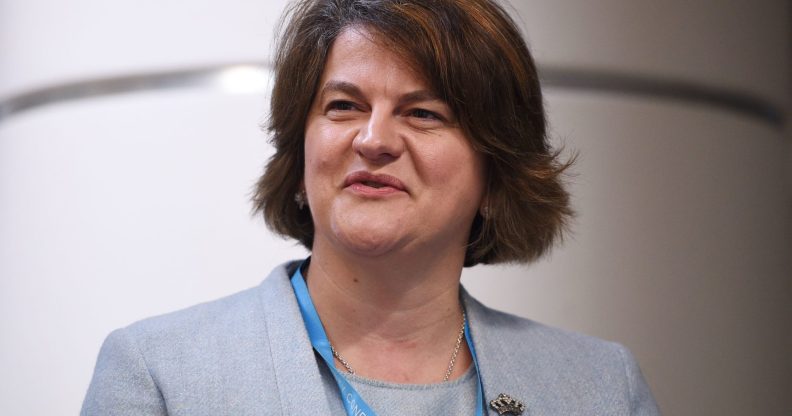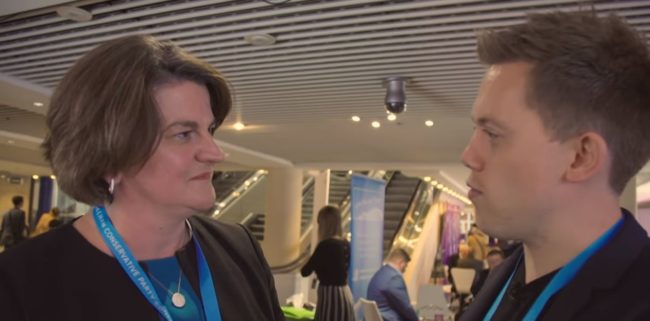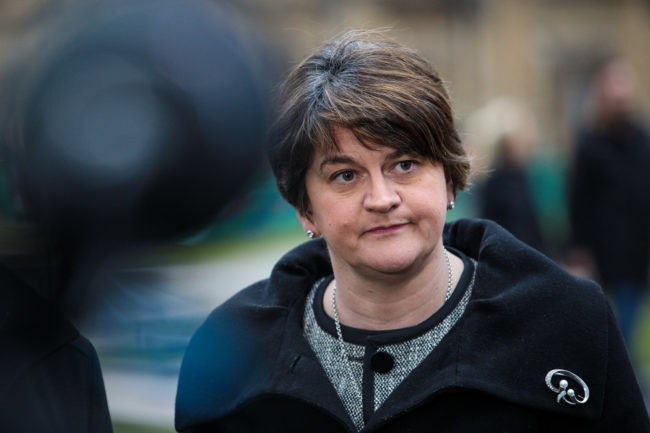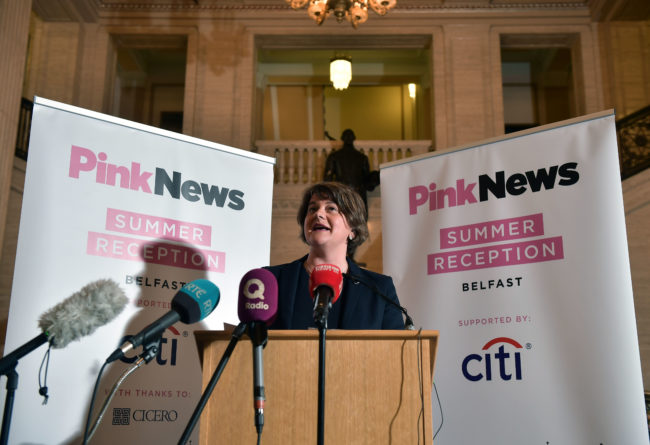Gay couples have ‘a right to express their love,’ says DUP leader Arlene Foster

Democratic Unionist Party leader Arlene Foster (OLI SCARFF/AFP/Getty)
The Democratic Unionist Party (DUP) leader Arlene Foster has suggested that the restored Northern Ireland Assembly would be able to pass an equal marriage law.
Foster was challenged on her opposition to equal marriage on Tuesday by left-wing columnist Owen Jones, during an interview at the Conservative Party conference in Birmingham.
Foster agreed that “gay people fall in love just like straight people,” adding: “They do have the right to express their love, nobody’s talking about anybody not being able to love another person.
“[But] I believe that marriage is between a man and a woman.”
Foster acknowledged that it “could well be the case” that the majority of people in Northern Ireland disagrees with her on equal marriage, but said the issue should be left for the future Assembly to deal with.
The DUP has long employed a peace process power known as the Petition of Concern to block votes in favour of equal marriage on the Northern Ireland Assembly.

Arlene Foster and Owen Jones (Screenshot/YouTube)
The stalemate is complicated due to the collapse of power-sharing government in the region. Northern Ireland has had no functioning government for nearly two years, preventing the Assembly from sitting.
Some LGBT+ activists have called for the British and Irish governments to act to implement equal marriage in the absence of power-sharing—but UK Prime Minister Theresa May, who is reliant on DUP support in Westminster, has been hesitant to act.
Foster also noted that it is unclear whether the DUP would be able to use a Petition of Concern on the issue in future, due to the changing make-up of the Assembly.
Foster said: “Owen, as you know, this is a matter for the Assembly. If the Assembly was back, and I want the Assembly back as quickly as possible, I’m quite sure it will come to the floor of the Assembly and I think people should wait and see.
“Of course, the composition of the Assembly has changed and the Petition of Concern is no longer available because we don’t have the 30 members, because the Assembly has shrunk from 108 members to 90 members, and therefore I think we need to allow the Assembly to have its space to debate this.”

Democratic Unionist Party (DUP) Leader Arlene Foster (Jack Taylor/Getty)
Asked whether she regrets the DUP’s likely-diminished veto, she added: “I don’t regret the fact the DUP won’t be able to veto it, I’m just simply saying the reality is, it’s for the Assembly to decide, and when the Assembly comes back which I hope is very, very soon, I’m sure this is an issue that will come through.”
“I think the important thing is, as a politician, you have to have principles, and I think if you believe in something, you should be allowed to articulate that view. If you have a belief, you should be able to have your belief, otherwise we would live in a very intolerant world, wouldn’t we?”
As a party leader, Foster has sought to soften the DUP’s stance on LGBT+ rights.
In June, she became the first DUP leader to attend an LGBT+ event, when she spoke to activists at the PinkNews Belfast summer reception, sponsored by Citi.

Democratic Unionist leader Arlene Foster attends the PinkNews summer reception at Stormont on June 28, 2018 in Belfast, Northern Ireland. (Charles McQuillan/Getty)
The DUP leader delivered a speech at the event that attempted to chart a middle-ground of respect for LGBT+ rights while defending her stance against same-sex marriage.
She also spent time meeting with many of the LGBT+ activists who were present.

